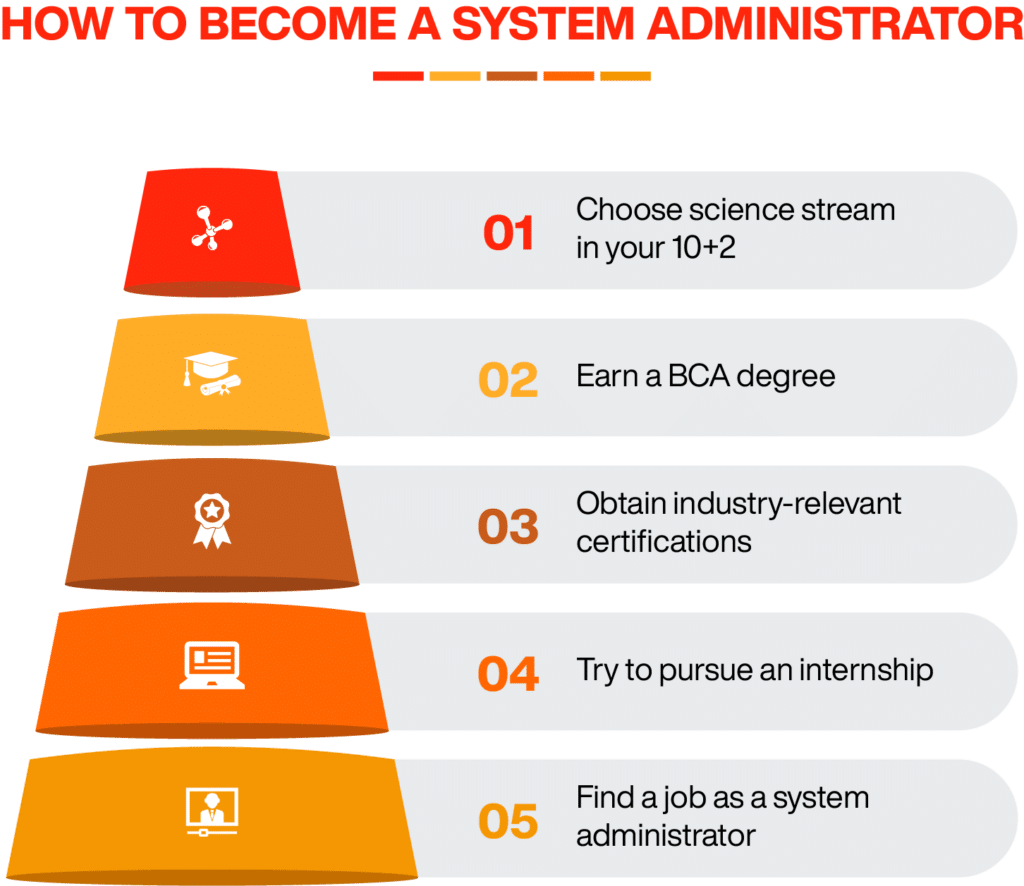Listen to this blog
System administration is responsible for maintaining reliable computer systems in a multi-user environment. A system administrator is a professional who performs diverse roles and responsibilities, ranging from configuring servers to monitoring networks and setting up new users on computers. They are tech experts who handle many roles to ensure the continuous and optimal performance of organizations’ IT services and support systems. These professionals play a prominent role as they are responsible for limiting disruptions to ensure the smooth functioning of their companies.
With India’s job market projected to grow by 9% in 2025, driven by IT, retail, and BFSI sectors, roles like system administrators appear promising. Additionally, the projected 15% growth in IT hiring for 2025 makes the prospects even more rewarding.
This blog further discusses the system administrator career path and the beginner system admin roadmap for aspirants looking ahead to have a fulfilling and rewarding career in this field.
Step 1: Understand the role & responsibilities
A system administrator is an IT professional who is responsible for ensuring that computer systems, servers, and network services, including the internet, function smoothly all the time.
What does a system administrator do? – Key tasks & responsibilities
In the system administrator career path, professionals perform varied job responsibilities, which differ depending on the employer’s requirements. They generally support tasks ranging from maintaining local area networks, end-user desktop computer systems, voice over the Internet Protocol phone systems, wireless LAN, and hybrid cloud storage.
Take a look at the key responsibilities of system administrators below:
- System administrators regularly check and ensure the optimal functioning and maintenance of system logs, network performance, and CPU & memory usage.
- They identify potential threats and issues by regularly analysing trends and data performance.
- They develop and implement strategies to protect crucial data and create and store copies of data to avoid data loss.
- System administrators employ firewalls and intrusion detection systems to ensure security measures.
- They perform periodic security audits to do vulnerability assessments of the organisation’s computer systems.
- They offer end-user technical support for all network-related issues, including hardware, software, and others.
Industry demand & job prospects – Career scope in different industries
The role of a system administrator is highly in demand across industries due to the continuous need for these professionals to upgrade and maintain computer networks. You can see the industry-wise career scope for System Administrators in the table below:
| Industry | Demand and Job Prospects | Average Salary |
|---|---|---|
| Banking, Financial Services | Secure financial data Manage servers Manage IT infrastructure | INR 6,00,000 per annum |
| Hardware, Networking | Oversee network as a whole Routine improvements and updates Ensure smooth handling of networking tasks Ensure security requirements | INR 5,70,000 per annum |
| Education, Training | Manage online learning platforms Manage student databases Maintain systems in IT labs | INR 5,60,000 per annum |
| Information Technology, Software | Maintain servers Manage networks and cloud systems Ensure optimal functioning of computer systems | INR 5,50,000 per annum |
| Consulting | Ensure smooth IT operations Secure client data Maintaining efficient IT solutions | INR 5,40,000 per annum |
| Healthcare | Maintain hospital IT systems Maintain electronic health records Ensure cybersecurity | INR 5,30,000 per annum |
| Advertising, PR, and Media | Support digital content management Manage video streaming services Maintain IT infrastructure in production houses | INR 5,30,000 per annum |
Step 2: Gain the necessary education & certifications
With the right educational qualifications and a sysadmin certification guide, aspirants can start their foundation for becoming system administrators. They can start by gaining formal education and degrees as well as pursuing certifications to enhance their careers.
Degree & certification requirements – IT degrees vs. certification paths
- Learners can take the traditional academic route to pursue a bachelor of Computer Application (BCA) after completing their 10+2 in science with a minimum of 50% aggregate score.
- This can be followed by enrolling for a master’s degree in Computer Application (MCA) in IT, Computer Science, System Administration, or Networking to become a system administrator.
Best system admin certification guide to enhance your resume – CompTIA, Microsoft, Cisco
- Although a certification course is not mandatory to pursue a career in system administration, certifications allow a competitive edge to acquire the best jobs and higher salaries in the competitive job market while building technical expertise among aspirants.
- Learners can acquire industry-recognized certifications like CompTIA, which suits professionals with server management experience.
- Further, associate-level certifications from Cisco and Microsoft are equally beneficial to establish the proficiency of candidates as system administrators.
Step 3: Develop essential technical & soft skills
Professionals in the role of a system administrator require certain key skills to keep the computer systems of their organization running smoothly. The IT admin skills checklist for system administrators includes a mix of technical and soft skills, which they need to develop to boost their resumes.
Key technical skills – Networking, scripting, cloud computing
- Networking Skills: Networking is a key skill required by system administrators. These professionals must have the right skills to manage servers and routers. They must also ensure network security and resolve network-related issues.
- Scripting: Scripting and coding are specialized roles focused on building programs and systems from the base. As a system administrator, having a basic knowledge of coding goes a long way in helping these professionals understand how the network works as well as to make quick fixes to solve errors when needed.
- Cloud computing: Cloud computing provides essential tech services over the internet to eliminate the need for user management. System administrators must know how to maintain and function in cloud systems and must be familiar with cloud applications like Google Cloud Platform, AWS, and Office365 to boost their job prospects.
Must-have soft skills – Problem-solving, communication
Below are some essential soft skills in the IT admin skills checklist that professionals must possess:
- Communication: System administrators are required to work and coordinate with different professionals within their organization, as well as with clients and other stakeholders. Hence, having proficiency in written and verbal communication, along with interpersonal skills, is important to collaborate effectively and complete projects efficiently.
- Problem-solving: System administrators must possess good problem-solving skills to make crucial decisions under pressure, troubleshoot to quickly identify network issues, and evaluate situations for the smooth running of systems.
- Attention to detail: Attention to detail helps candidates identify errors and vulnerabilities in the system security that cause downtime. Since these professionals have to analyze huge data sets to draw insights, this skill helps in eliminating errors.
Step 4: Gain hands-on experience & build a portfolio
The best way to gain experience is through internships or entry-level sysadmin jobs in system administration, especially for freshers, to help them apply their skills in real-world situations.
Entry-level sysadmin jobs & internships – How to gain practical exposure?
An internship is an opportunity that gives learners hands-on experience in system administrator jobs. Recent graduates or final-year students are generally considered by companies for a specific period to help them learn skills and gain practical exposure. Candidates can also learn system administration job skills by joining entry-level positions in different companies across industries.
Home labs & open-source projects – Ways to showcase skills
Candidates can also set up home labs to practice various system administrator job roles like troubleshooting, networking, and server management in a real-world environment for hands-on practice. Additionally, contributing to open-source projects is another way to showcase the technical skills of system administrators, along with portraying their collaboration and problem-solving abilities to potential recruiters.
Step 5: Apply for system administrator roles
To increase their chances of securing a system administrator job role, candidates can tailor their resumes to highlight their skills and apply for the relevant jobs.
Where to find jobs? – Top platforms & networking tips
LinkedIn, Indeed, Naukri, Foundit (earlier Monster), and Glassdoor are the top platforms in India to look for system administrator jobs for freshers and experienced candidates at entry-level and senior positions. Applicants can also post their resumes on company websites to join their preferred organizations in the IT, banking, and other sectors.
Here are some networking tips for applicants:
- Connect with IT professionals and recruiters on LinkedIn
- Join tech communities and forums like Reddit
- Attend industry events, webinars, and conferences
- Reach out to your college alumni networks
How to prepare for interviews – Common questions & best practices
IT job interviews include both technical and behavioral questions. Hence, it is crucial to review your IT skills by analyzing them and practicing their explanations. You may think of examples or situations when things got out of hand and how you controlled them. Real-life examples will help you confidently answer during the interview.
Here are some common questions to prepare:
- What skills or qualities make you a great system administrator?
- Have you worked with computer hardware? What were your experiences like?
- How can you tell when a server needs an upgrade?
- What steps would you take to remove a virus from a computer?
- Tell us about a time you faced a tough IT problem. How did you handle it?

Enroll in an MCA program at Online Manipal
An online MCA program by the Manipal Academy of Higher Education (MAHE) is a beginner system admin roadmap that allows learners to acquire industry-relevant skills and hands-on experiences. MAHE is a NAAC A++ accredited, UGC-entitled, and AICTE-approved institution offering some of the best online MCA specializations, including Cloud Computing, AI & ML, Cybersecurity, and Full Stack Development, for candidates to choose from.
The program, offered on the Online Manipal platform, improves the job potential and earning scope of learners in the system administrator career path. Designed for students as well as working professionals, the online MCA program allows candidates easy access to the prestigious alumni network of MAHE.
Conclusion
The online Master of Computer Application (MCA) program offered by MAHE on the Online Manipal platform equips students with enhanced expertise in emerging areas to acquire rewarding jobs in IT and other sectors. Moreover, a projected 20-25% growth in IT recruitment in 2025 further boosts their opportunities for job advancements and salaries as system administrators.
Prepare for your next career milestone with us










